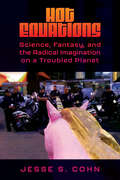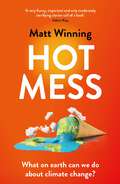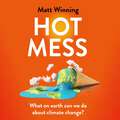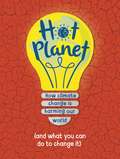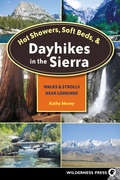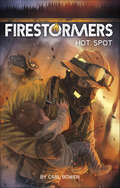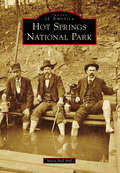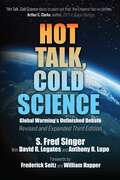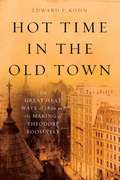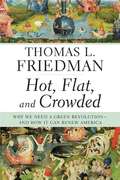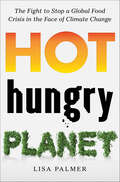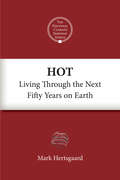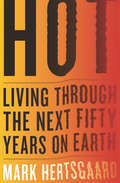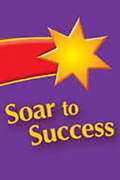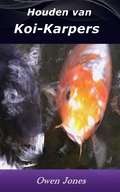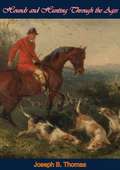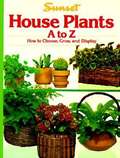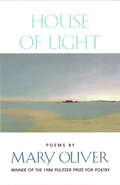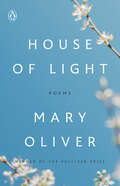- Table View
- List View
Hot Equations: Science, Fantasy, and the Radical Imagination on a Troubled Planet
by Jesse S. CohnInspired by the new diversity of science fiction, fantasy, and horror in the twenty-first century, Hot Equations: Science, Fantasy, and the Radical Imagination on a Troubled Planet confronts the kinds of literary and political “realism” that continue to suppress the radical imagination. Alluding both to the ongoing climate catastrophe and to Tom Godwin’s “The Cold Equations”—that famous touchstone of “hard science fiction”—Hot Equations reads the crises of our "post-normal" moment via works that increasingly subvert genre containment and spill out into the public sphere. Drawing on archives and contemporary theory, author Jesse S. Cohn argues that these imaginative works of science fiction, fantasy, and horror strike at the very foundations of modernity, calling its basic assumptions into question. They threaten the modern order with a simultaneously terrible and promising anarchy, pointing to ways beyond the present medical, ecological, and political crises of pandemic, climate change, and rising global fascism. Examining books ranging from well-known titles like The Hunger Games and The Caves of Steel to newer works such as Under the Pendulum Sun and The Stone Sky, Cohn investigates the ways in which science fiction, fantasy, and horror address contemporary politics, social issues, and more. The “cold equations” that established normal life in the modern world may be in shambles, Cohn suggests, but a New Black Fantastic makes it possible for the radical imagination to glimpse viable possibilities on the other side of crisis.
Hot Mess: What on earth can we do about climate change?
by Matt Winning'A very funny, important and only moderately terrifying clarion call of a book' - Adam Kay'HOT MESS provides loads of laughs about "the climate situation" and will position you at the right point between fear and determination' - Mark Watson 'Hilarious, informative and worrying in equal measure. And that's just the bits about having a baby' - Josie LongFor fans of Randall Munro's WHAT IF? Matt Parker's HUMBLE PI and anyone looking for practical tips on how to stop the end of the world!Dr Matt Winning is a stand-up comedian and environmental economist with a PHD in climate change policy, which means he's the sort of doctor who will rush to your side if you fall ill on a plane, but only to berate you for flying. We are currently facing a global climate emergency. You've probably noticed. But why does the end of the world need to be so depressing? HOT MESS aims to both lighten the mood and enlighten readers on climate change. This is a book for people who care about climate change but aren't doing much about it, helping readers understand what the main causes of climate change are, what changes are needed, and what they can (and cannot) do about it. But, most importantly, it is book that'll help people find the comedy in climate change, because if we can do that, well, we can do bloody anything.'Climate change is no laughing matter - oh yes it is - with Matt Winning's superb, hilarious, side-splitting book that makes you take a whole new look at the climate crisis, surviving having children and life in general' - Mark Maslin, author of How to Save Our Planet'The first book about climate change that made me laugh out loud. If you've been too freaked out to subject yourself to the climate crisis, Hot Mess is the kick in the pants you need to start making yourself useful.' - Prof. Kimberly Nicholas, author of Under the Sky We Make: How to Be Human in a Warming World
Hot Mess: What on earth can we do about climate change?
by Matt Winning'A very funny, important and only moderately terrifying clarion call of a book' - Adam Kay'HOT MESS provides loads of laughs about "the climate situation" and will position you at the right point between fear and determination' - Mark Watson 'Hilarious, informative and worrying in equal measure. And that's just the bits about having a baby' - Josie LongFor fans of Randall Munro's WHAT IF? Matt Parker's HUMBLE PI and anyone looking for practical tips on how to stop the end of the world!Dr Matt Winning is a stand-up comedian and environmental economist with a PHD in climate change policy, which means he's the sort of doctor who will rush to your side if you fall ill on a plane, but only to berate you for flying. We are currently facing a global climate emergency. You've probably noticed. But why does the end of the world need to be so depressing? HOT MESS aims to both lighten the mood and enlighten readers on climate change. This is a book for people who care about climate change but aren't doing much about it, helping readers understand what the main causes of climate change are, what changes are needed, and what they can (and cannot) do about it. But, most importantly, it is book that'll help people find the comedy in climate change, because if we can do that, well, we can do bloody anything.'Climate change is no laughing matter - oh yes it is - with Matt Winning's superb, hilarious, side-splitting book that makes you take a whole new look at the climate crisis, surviving having children and life in general' - Mark Maslin, author of How to Save Our Planet'The first book about climate change that made me laugh out loud. If you've been too freaked out to subject yourself to the climate crisis, Hot Mess is the kick in the pants you need to start making yourself useful.' - Prof. Kimberly Nicholas, author of Under the Sky We Make: How to Be Human in a Warming World
Hot Mess: What on earth can we do about climate change?
by Matt WinningWhat is climate change, who's to blame, and what the f**k can we do about it? Award-winning comedian and climate change researcher Dr Matt Winning explains all.For fans of Randall Munro's WHAT IF? Matt Parker's HUMBLE PI and anyone looking for practical tips on how to stop the end of the world!Dr Matt Winning is a stand-up comedian and environmental economist with a PHD in climate change policy, which means he's the sort of doctor who will rush to your side if you fall ill on a plane, but only to berate you for flying. We are currently facing a global climate emergency. You've probably noticed. But why does the end of the world need to be so depressing? HOT MESS aims to both lighten the mood and enlighten readers on climate change. This is a book for people who care about climate change but aren't doing much about it, helping readers understand what the main causes of climate change are, what changes are needed, and what they can (and cannot) do about it. But, most importantly, it is book that'll help people find the comedy in climate change, because if we can do that, well, we can do bloody anything.(P) 2021 Headline Publishing Group Ltd
Hot Planet: How climate change is harming Earth (and what you can do to help)
by Anna ClaybourneHot Planet offers young readers the perfect, non-alarmist introduction to Earth's climate change crisis Climate change is a new reality in today's world. From melting ice caps to forest fires, climate change is responsible for dramatic freak weather events and Earth is now warmer than it has been at any point in the last 650,000 years.Hot Planet aims to raise readers aged nine and up's awareness of the challenges of climate change in a non-alarmist, yet realistic, way. It explores what climate change is, what is believed to cause it, its current impact on the world and what might happen in the future if it progresses at current rates. It also highlights the social inequality of climate change, as richer and more industrialised countries contribute far more heavily to climate change through their energy consumption, yet poorer, less developed nations are currently much more affected by it.The book looks ahead at how we can all help combat the climate change crisis, from global changes such as investing in sustainable energy sources to reduce our dependence on fossil fuels, to green schemes such as carbon pricing, to practical solutions such as eating less meat and using public transport or cycling, rather than driving. The author, Anna Claybourne, is an award-winning science writer.
Hot Showers, Soft Beds, and Dayhikes in the Sierra
by Kathy MoreyWith this book in hand, hikers can spend their days wandering in wildflower meadows, hiking to cragged peaks, or swimming in cobalt-blue lakes in the Sierra Nevada, and then settle into a deck chair at sunset to enjoy the alpenglow. Hot Showers, Soft Beds, & Dayhikes in the Sierra describes 112 carefully chosen dayhikes in Yosemite, Sequoia and Kings Canyon national parks, John Muir, Ansel Adams, Desolation, and Emigrant wilderness areas, and more. Many hikes have easy-through-strenuous options, and every hike listed is in close proximity to one or more quality accommodations (over 80 cabins, B&Bs, motels, lodges, guest ranches, and resorts are described).
Hot Spot (Firestormers)
by Carl BowenAn epic wildfire rages in the Pacific Northwest, and the world’s newest, most elite firefighting crew — the FIRESTORMERS — is on the scene. But so are a group of conservationists, bent on defending the habitat of a rare, endangered bird species. With lives and land at stake, crew boss Anna MacElreath and the Firestormers must decide who or what to save inside this latest hot spot.
Hot Springs National Park
by Mary Bell HillHot Springs was one of the first areas set aside as a federal land reservation in 1832--predating the first national park at Yellowstone by 40 years. In 1921, it was officially designated a national park. Physically the smallest of the 59 US national parks today, Hot Springs measures just larger than 5,500 acres. Its 47 on-site springs produce more than 700,000 gallons of thermal water per day. From early natives who quarried novaculite found in the surrounding hills to famous politicians, performers, and athletes, people have been coming to these springs for thousands of years to partake in the supposed healing powers of the water. Pres. Franklin Roosevelt, boxer Jack Dempsey, and French opera diva Lily Pons are a few of the visitors who made the trek to the "Valley of the Vapors." The history of Hot Springs National Park revolves around peoples' interactions with its thermal water.
Hot Stuff: Hot Springs, Geysers, and More (Fountas & Pinnell Classroom, Guided Reading Grade 6)
by Charlotte RoseNIMAC-sourced textbook
Hot Talk, Cold Science: Global Warming's Unfinished Debate
by S. Fred Singer David R. Legates Anthony R. LupoThe revised and expanded third edition of Hot Talk, Cold Science forms the capstone of the distinguished astrophysicist Dr. S. Fred Singer&’s lucid, yet hard scientific look at climate change. And the book is no less explosive than its predecessors—and certainly never more timely.Singer explores the inaccuracies in historical climate data and the failures of climate models, as well as the impact of solar variability, clouds, ocean currents, and sea levels on global climate—plus factors that could mitigate any human impact on world climate. Singer&’s masterful analysis decisively shows that the pessimistic, and often alarming, global-warming scenarios depicted in the media have no scientific basis. In fact, he finds that many aspects of increased levels of CO2, as well as any modest warming, such as a longer growing seasons for food and a reduced need to use fossil fuels for heating, would have a highly positive impact on the human race. As alarmists clamor to impose draconian government restrictions on entire populations in order to combat "climate change," this book reveals some other startling, stubborn contradictory facts, including: CO2 has not caused temperatures or sea levels to rise beyond historical rates. Severe storms have not increased in frequency or intensity since 1970—neither have heat waves nor droughts. Global "climate change" is not harming coral reefs. Any increases in CO2 concentrations across huge time spans haven't preceded rising global temperatures, they&’ve followed them by about 600 to 800 years—just the opposite of alarmist claims. "Carbon" taxes and other "solutions" to the global warming "crisis" would have severe consequences for economically disadvantaged groups and nations. Alarmist climate scientists have hidden their raw temperature data and deleted emails—then undermined the peer-review system to squelch debate. In sum, despite all the hot talk—and outright duplicity—there is no "climate crisis" resulting from human activities and no such threat on the horizon.
Hot Time in the Old Town: The Great Heat Wave of 1896 and the Making of Theodore Roosevelt
by Edward P. KohnA vivid narrative that captures the birth of the progressive era, Hot Time in the Old Town revives the forgotten disaster that almost destroyed a great American city when one of the worst natural disasters in American history, the 1896 New York heat wave killed almost 1,500 people in ten oppressively hot days.
Hot, Flat, and Crowded: Why We Need a Green Revolution - and How It Can Renew America
by Thomas L. FriedmanFriedman shows how the 2 biggest crises of today (America's loss of focus since 9/11 and the global environment crisis) are linked and how we can restore the world and revive America at the same time
Hot, Hot Mud Pots (Fountas & Pinnell Classroom, Guided Reading)
by Javier TempkinNIMAC-sourced textbook. Beware of the Puddles. Mud pots are puddles of very, very, very hot mud. They look like boiling, muddy soup. They're so hot, they can burn the shoes right off your feet!
Hot, Hungry Planet: The Fight to Stop a Global Food Crisis in the Face of Climate Change
by Lisa PalmerEarth will have more than 9.6 billion people by 2050 according to U.N. predictions. With resources already scarce, how will we feed them all? Journalist Lisa Palmer has traveled the world for years documenting the cutting-edge innovations of people and organizations on the front lines of fighting the food gap. Here, she shares the story of the epic journey to solve the imperfect relationship between two of our planet’s greatest challenges: climate change and global hunger.Hot, Hungry Planet focuses on three key concepts that support food security and resilience in a changing world: social, educational, and agricultural advances; land use and technical actions by farmers; and policy nudges that have the greatest potential for reducing adverse environmental impacts of agriculture while providing more food. Palmer breaks down this difficult subject though seven concise and easily-digestible case studies over the globe and presents the stories of individuals in six key regions—India, sub-Saharan Africa, the United States, Latin America, the Middle East, and Indonesia—painting a hopeful picture of both the world we want to live in and the great leaps it will take to get there.
Hot: Living Through the Next Fifty Years on Earth
by Mark Hertsgaard Eban GoodsteinOn December 7, 2011, Mark Hertsgaard participated in The National Climate Seminar, a series of webinars sponsored by Bard College's Center for Environmental Policy. The online seminars provide a forum for leading scientists, writers, and other experts to talk about critical issues regarding climate change. The series also opens a public conversation, inviting participants to ask questions and contribute their own thoughts. Hertsgaard has spent the last two decades reporting on climate change for media outlets including The New Yorker, NPR, Time, Vanity Fair, and The Nation, where he is the environment correspondent. His lecture focused on political movements and how environmental advocates can provoke change in public attitudes and on Capitol Hill. Hertsgaard sees 2011's Occupy movement as a sign of real hope and discussed what climate activists can learn from Occupy's tactics. This E-ssential is an edited version of Hertsgaard's talk and the subsequent question and answer session. While some material has been cut and some language modified for clarity, the intention was to retain the substance of the original discussion.
Hot: Living Through the Next Fifty Years on Earth (National Climate Seminar Ser. #5)
by Mark HertsgaardA fresh take on climate change by a renowned journalist driven to protect his daughter, your kids, and the next generation who'll inherit the problem For twenty years, Mark Hertsgaard has investigated global warming for outlets including the New Yorker, NPR, Time, Vanity Fair, and The Nation. But the full truth did not hit home until he became a father and, soon thereafter, learned that climate change had already arrived-a century earlier than forecast-with impacts bound to worsen for decades to come. Hertsgaard's daughter Chiara, now five yea rs old, is part of what he has dubbed "Generation Hot"--the two billion young people worldwide who will spend the rest of their lives coping with mounting climate disruption. HOT is a father's cry against climate change, but most of the book focuses on s olutions, offering a deeply reported blueprint for how all of us-as parents, communities, companies and countries-can navigate this unavoidable new era. Combining reporting from across the nation and around the world with personal reflections on his daugh ter's future, Hertsgaard provides "pictures" of what is expected over the next fifty years: Chicago's climate transformed to resemble Houston's; dwindling water supplies and crop yields at home and abroad; the redesign of New York and other cities against mega-storms and sea-level rise. Above all, he shows who is taking wise, creative precautions. For in the end, HOT is a book about how we'll survive.
Hotshots!
by Chris L. DemarestSparks from a train ignite a field baked for days. Then winds whip it into a fast-running blaze. With fire now spreading out of control, the hotshots are called. They're ready to roll. What are hotshots?They are an elite ground fire-fighting corps of men and women highly trained to understand the scientific nature of fire in order to go deep into the heart of a wildfire, beyond the reach of hose lines, to limit the destruction of land and wildlife. As more homes are being built into the natural landscape, the role of the hotshot in fighting fire has become increasingly important. With stunning pictures and an action-packed text, fine artist and volunteer firefighter Chris L. Demarest here captures the spirit of the dedicated hotshots and the real-life drama of the dangerous work they must do every day.
Houden van Koi Karp (Hoe U... #1)
by Owen JonesHouden van Koi Karp De inhoud van dit e-boek over Koi-tuinvijvers en aanverwante onderwerpen is onderverdeeld in achttien hoofdstukken, die je zullen helpen om een site voor je Koi Carp Pond te kiezen, deze het hele jaar door in te stellen en te onderhouden en te zorgen voor je waardevolle vis tijdens de verschillende seizoenen en zelfs in bijzonder ongunstige weersomstandigheden. Het kan zelfs helpen om je in een nieuwe carrière te begeven. Het minste dat het zal doen is u honderden besparen op professioneel advies. Als een toegevoegde bonus, verleen ik u toestemming om de inhoud op uw eigen website of in uw eigen blogs en nieuwsbrief te gebruiken, hoewel het beter is om deze eerst in uw eigen woorden te herschrijven. U kunt het boek ook splitsen en de artikelen doorverkopen. In feite is het enige recht dat u niet hebt, het opnieuw verkopen of weggeven van het boek zoals het aan u is bezorgd. Als u feedback heeft, laat deze dan achter bij het bedrijf waar u dit boek van heeft gekocht of stuur het naar mij op owen@amiabledragon.com Je kunt meer boeken vinden zoals deze waar je deze hebt gekocht
Houghton Mifflin Discovery Works: Earth's Water
by Silver Burdett GinnWhere are sources of fresh water found? Think about where the water you use every day comes from. Is it brought by pipes from a faraway reservoir like the one shown? Does it come from a well drilled deep in the ground? Or does it come from some other source? What things in water can be harmful? Building a model of a water-filtering system will help you investigate how water that is dirty and unsafe is made clean and safe for drinking.
Hounds and Hunting Through the Ages (The\derrydale Press Foxhunters' Library)
by Joseph B. ThomasHounds and Hunting through the Ages remains the definitive volume for the foxhunter of all skill levels. This primer of foxhunting covers all aspects of the sport, from the history and technique of hunting, to the development, selection, breeding and training of hounds.Beautifully illustrated throughout, this edition contains a complete glossary of hunting terms. It also includes a Foreword by Mason Houghland, the author of Gone Away and contributor of numerous stories on foxhunting to national magazines, as well as an Introduction by the Earl of Lonsdale, himself a keen sportsman whose name would later be given to the Lonsdale clothing brand.Authoritative and comprehensive, this great modern classic of the chase remains one of the most famous books of our time on the whole art and sport of Foxhunting.An essential addition to any sporting library.
House Gods: Sustainable Buildings and Renegade Builders
by Jim KristoficOur buildings are making us sick. Our homes, offices, factories, and dormitories are, in some sense, fresh parasites on the sacred Earth, Nahasdzáán. In search of a better way, author Jim Kristofic journeys across the Southwest to apprentice with architects and builders who know how to make buildings that will take care of us. This is where he meets the House Gods who are building to the sun so that we can live on Earth. Forever.In House Gods, Kristofic pursues the techniques of sustainable building and the philosophies of its practitioners. What emerges is a strange and haunting quest through adobe mud and mayhem, encounters with shamans and stray dogs, solar panels, tragedy, and true believers. It is a story about doing something meaningful, and about the kinds of things that grow out of deep pain. One of these things is compassion—from which may come solace. We build our buildings, we make our lives—we are the House Gods.
House Plants
by Sunset Publishing StaffCatalogues common house plants from A to Z and provides tips for proper care.
House Plants for the Purple Thumb
by Maggie BaylisMaggie Baylis provides a how-to book for houseplants.
House of Light
by Mary OliverThis collection of poems by Mary Oliver once again invites the reader to step across the threshold of ordinary life into a world of natural and spiritual luminosity.Tell me, what is it you plan to dowith your one wild and precious life?—Mary Oliver, "The Summer Day" (one of the poems in this volume)Winner of a 1991 Christopher AwardWinner of the 1991 Boston Globe Lawrence L. Winship Book AwardThis book was published with two different covers. Customers will be shipped the book with one of the available covers.
House of Light: Poems
by Mary Oliver&“Tell me, what is it you plan to dowith your one wild and precious life?&”—Mary Oliver&“The Summer Day&” (House of Light)Mary Oliver&’s words guide us, with solace and empathy, across the rocky terrain of human existence. In House of Light, which was originally published in 1990, the Pulitzer Prize-winning poet offers us an opportunity to transcend ordinary life into a realm of natural wonder. Oliver investigates themes on &“how to love this world" and to live &“as though time didn&’t exist&” in her poems &“Spring&” and &“The Swan,&” and she awakens within us a renewed sense of awe in &“The Ponds&”: &“Still, what I want in my life / is to be willing / to be dazzled— / to cast aside the weight of facts // and maybe even / to float a little / above this difficult world.&” As her words suspend time and space, Oliver encourages us to attune ourselves to the quiet moments of enlightenment that perforate each day. Meditative and soulful, the forty-six poems in this collection honor our collective threads of humanity and our never-ending quest for grace. &“Oliver's poems are thoroughly convincing—as genuine, moving, and implausible as the first caressing breeze of spring.&” —The New York Times Book Review
